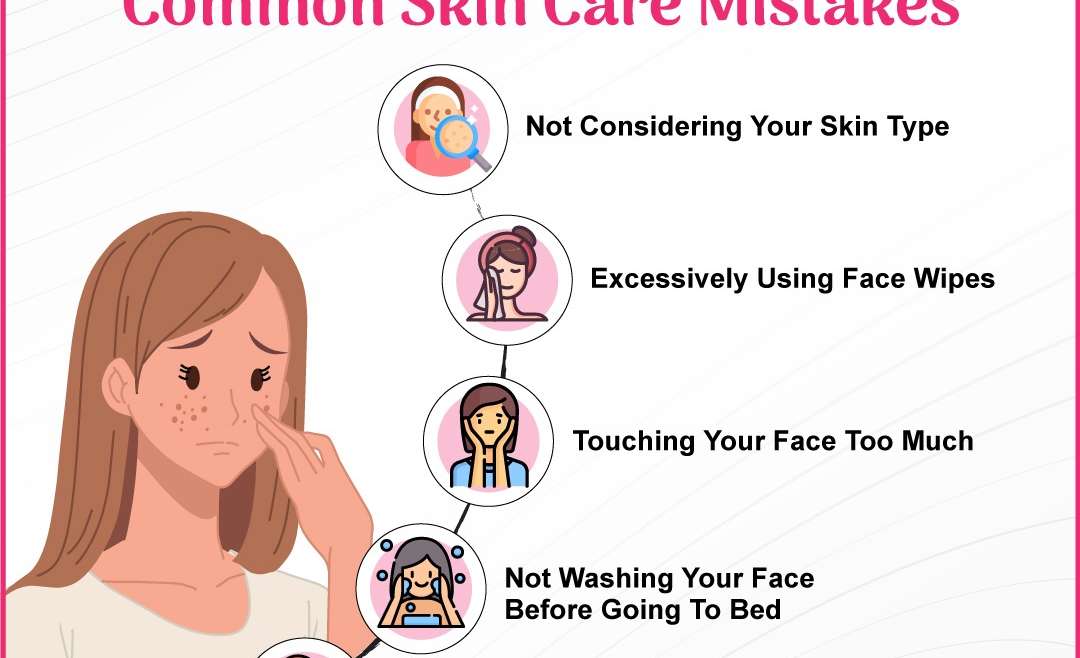When it comes to skincare, we all want to achieve clear, healthy, and radiant skin. However, there are several common mistakes that many people make when it comes to taking care of their skin. By avoiding these pitfalls, you can help maintain the health and appearance of your skin. Here are five common skincare mistakes you need to avoid:
Not Considering Your Skin Type
One of the most fundamental mistakes people make in their skincare routine is not considering their skin type. Using products that are not suitable for your skin type can lead to adverse reactions, including dryness, acne, and irritation. It’s essential to understand your skin type—whether it’s dry, oily, combination, or sensitive—and choose skincare products that cater to your specific needs.
Excessively Using Face Wipes
While face wipes can be convenient for removing makeup and freshening up on the go, using them excessively can be harmful to your skin. Many face wipes contain harsh chemicals and preservatives that can strip the skin of its natural oils and disrupt its pH balance, leading to dryness and irritation. It’s best to limit the use of face wipes and opt for gentle, hydrating cleansers instead.
Touching Your Face Too Much
It’s a habit many of us are guilty of—constantly touching our face throughout the day. However, this can transfer dirt, oil, and bacteria from your hands to your face, leading to clogged pores, breakouts, and irritation. To minimize the risk of skin issues, try to avoid touching your face unnecessarily and make a conscious effort to keep your hands clean.
Not Washing Your Face Before Going To Bed
After a long day, it can be tempting to skip your nighttime skincare routine and head straight to bed. However, failing to cleanse your face before bedtime can allow dirt, oil, and makeup to build up on your skin overnight, leading to clogged pores and blemishes. It’s crucial to wash your face before going to bed to remove impurities and allow your skin to breathe and regenerate while you sleep.
Not Having Your Skin Examined By A Dermatologist
Regular check-ups with a dermatologist are just as important as any other aspect of your healthcare routine. A dermatologist can help identify any skin issues, provide personalized recommendations, and monitor changes in your skin over time. Whether you have a specific concern or simply want to ensure the overall health of your skin, scheduling regular appointments with a dermatologist is a proactive step in maintaining healthy skin.
In conclusion, avoiding these common skincare mistakes and making simple changes to your routine can contribute to healthier, clearer, and more radiant skin. By considering your skin type, being mindful of your habits, and seeking professional guidance when necessary, you can take positive steps towards achieving your skincare goals.
Best skin Specialist and Dermatologist in Guntur
Are you struggling with your skin care routine? Avoid common mistakes and achieve flawless skin by consulting with the best skin specialist and dermatologist in Guntur, Dr. Sneha Kovi. With expertise in advanced dermatological treatments, Dr. Kovi provides personalized care to help you maintain healthy, glowing skin.
Contact Dr. Sneha Kovi today to schedule your consultation and take the first step towards perfect skin.
FAQs about Common skin care routine
- What is the best skincare routine?
- What are some ingredients to look for in skincare products?
- How often should I exfoliate my skin?
- What are some common skincare mistakes to avoid?
- How can I treat acne?
- What is the difference between dry and dehydrated skin?
- Can a skin care routine really help with anti-aging?
- How can I protect my skin care from the sun?
- What are some natural remedies for skincare?
- How important is diet and hydration for skin health?

